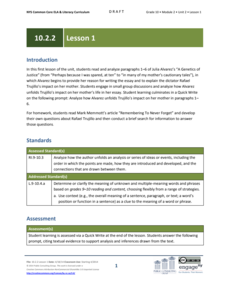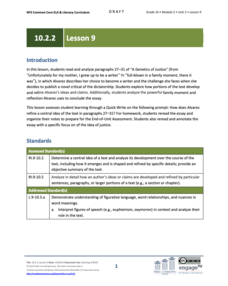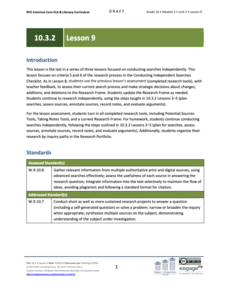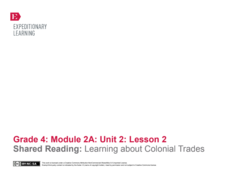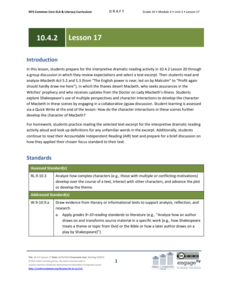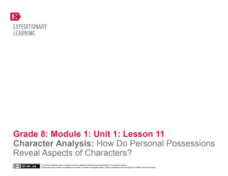EngageNY
Grade 10 ELA Module 2: Unit 3, Lesson 3
What is in a word? Scholars look closely at the words from a speech by Eleanor Roosevelt. They analyze how she supports a claim without debate and without rejecting others. Learners use jigsaw discussion, guided questions, and respond to...
EngageNY
Grade 10 ELA Module 2: Unit 2, Lesson 2
What is a megalomaniac? Scholars discover the word's meaning as they read and analyze paragraphs seven and eight from Julia Alvarez's essay "A Genetics of Justice." They also read Mark Memmott's article "Remembering to Never Forget" and...
EngageNY
Grade 10 ELA Module 2: Unit 2, Lesson 1
Rafael Trujillo was president of the Dominican Republic in the 1930s. Pupils read and analyze the first six paragraphs of Julia Alvarez's autobiographical essay "A Genetics of Justice," in which the author describes Trujillo's impact on...
EngageNY
Grade 10 ELA Module 2: Unit 2, Lesson 6
How do authors use rhetorical devices and word choice to emphasize their ideas? Pupils consider the question while reading paragraphs 16–19 from Julia Alvarez's essay "A Genetics of Justice." Readers engage in evidence-based discussion...
EngageNY
Grade 10 ELA Module 2: Unit 2, Lesson 9
How do authors develop the main ideas in their writing? Pupils consider the question as they read and analyze paragraphs 27–31 from Julia Alvarez's essay "A Genetics of Justice," in which Alvarez describes her decision to become a...
EngageNY
Grade 10 ELA Module 2: Unit 3, Lesson 7
It's time to show what you know. The final lesson asks scholars to reflect on the seven-lesson plan unit and complete an end-of-unit task. Readers consider the claims presented in speeches by Eleanor Roosevelt and Malala Yousafzai before...
EngageNY
Grade 10 ELA Module 3: Unit 2, Lesson 9
Do you know what the plan is? Scholars are now ready to complete the final instructional activity of independent research before finalizing their plans. Ultimately, they turn in all research tool sheets and frames and organize their...
EngageNY
Shared Reading: Learning About Colonial Trades
Trading in Colonial America is the focus of a lesson plan that boosts reading skills. As a class, scholars examine the informational text for crucial details, use their newfound knowledge to share information with their peers, and write...
EngageNY
Grade 10 ELA Module 3: Unit 3, Lesson 10
Can budding writers accept constructive criticism? Learners work with their peers to gain feedback about their argumentative essay drafts. Peers give one another constructive criticism to revise their work better. Using a Peer Review...
EngageNY
Grade 10 ELA Module 4, Unit 2, Lesson 26
How do directors' choices emphasize different elements of a drama? Scholars participate in a discussion about the Royal Shakespeare Company production of Macbeth and Akira Kurosawa's Throne of Blood. Finally, they write an analysis of...
EngageNY
Grade 10 ELA Module 4: Unit 3, Lesson 4
According to Machiavelli, a good ruler does whatever it takes. Using the resource, scholars work in small groups to analyze quotes from The Prince and then participate in a whole-class discussion. To finish, pupils select a phrase and...
EngageNY
Grade 10 ELA Module 4: Unit 2, Lesson 17
Madness, violence, despair—the titular character of Shakespeare's Macbeth is spiraling out of control. Pupils first explore the topic with a collaborative jigsaw discussion. At the end of the instructional activity, they write about how...
EngageNY
Grade 11 ELA Module 1: Unit 3, Lesson 3
Virginia Woolf didn't believe a woman could have written Shakespeare's works. Using the resource, scholars engage in a silent discussion to analyze how Woolf uses rhetoric to convey her point of view in A Room of One's Own. Pupils write...
EngageNY
Grade 11 ELA Module 1: Unit 2, Lesson 18
How does the comparison of Hamlet to Fortinbras develop Hamlet's character? Scholars complete a Quick Write to answer the question. They also continue their exploration of Shakespeare's Hamlet, reading and discussing Act 4.4.
EngageNY
Grade 11 ELA Module 1: Unit 2, Lesson 14
How do Ophelia's interactions with Hamlet help develop her character? Pupils continue reading Act 3.1 from Shakespeare's Hamlet. Using writing and discussion, scholars analyze the dialogue between Hamlet and Ophelia, paying particular...
EngageNY
Grade 11 ELA Module 2: Unit 2, Lesson 13
Two minds are better than one. Learners engage in an evidence-based discussion to identify central ideas in Audre Lorde's poem "From the House of Yamanjá" and one additional nonfiction text. They complete a Cross-Evidence Collection Tool...
EngageNY
Grade 11 ELA Module 2: Unit 1, Lesson 11
What is the connection? As scholars read paragraph nine of the chapter "Of Our Spiritual Strivings," they determine how Du Bois connects the ideas he presents in the text. They then participate in class discussions, define words, answer...
EngageNY
Grade 11 ELA Module 2: Unit 1, Lesson 7
Give the class some clarification. Scholars determine how Du Bois develops his central ideas in the chapter "Of Our Spiritual Strivings" by refining and clarifying his ideas. They organize their thoughts by annotating and recording the...
EngageNY
Grade 11 ELA Module 2: Unit 1, Lesson 8
Was freedom really free? Scholars analyze paragraphs six and seven of Du Bois's chapter "Of Our Spiritual Strivings." They look at how the author uses rhetoric to strengthen his point of view about freedom. Learners complete a Rhetorical...
EngageNY
Grade 11 ELA Module 2: Unit 1, Lesson 19
Scholars look at paragraphs two and three in the "Atlanta Compromise" speech. They analyze how Washington uses a story about a ship lost at sea and rhetorical devices to develop his point of view. After class discussion and completing...
EngageNY
Analyzing the Content of a Model Essay: “How Ha’s Mother Is Turned ‘Inside Out’”
What are the psychological and emotional effects associated with being a refugee? Scholars consider the question by reading and analyzing an essay, "How Ha's Mother is Turned 'Inside Out.'" Once finished, they engage in a whole-class...
EngageNY
Character Analysis: How Do Personal Possessions Reveal Aspects of Characters?
Learners use a jigsaw activity to examine characters in "Left Behind." Each group member focuses on a different character and then regroups to those with the same focus. Class members then return to their home groups for discussion...
EngageNY
Central Idea and Supporting Details: “Equal Rights for Women”
It's my right, not a privilege! Scholars review the details of the claims in the speech "Equal Rights for Women." They meet with one of their discussion appointments from a previous instructional activity to locate evidence to support...
EngageNY
World Cafe: Analyzing Sojourner Truth’s “Ain’t I a Woman?”
May I take your order? Scholars read "Ain't I a Woman" and participate in a World Cafe. They work in small groups to discuss text-related questions and then complete a Note-Catcher sheet to organize their thoughts. For homework, learners...




